|
|
|
|
|
|
|
|
|
No Arctic-science events are announced today.
|
Media
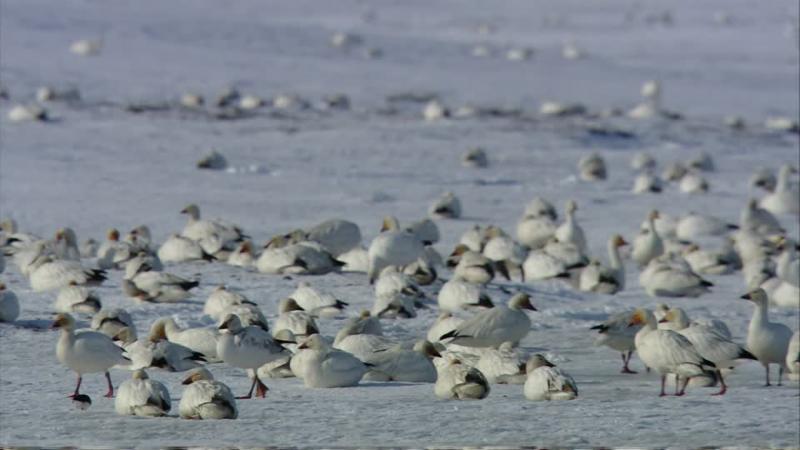 Researchers Seek Inuit Knowledge to Understand Kivalliq Snow Goose Boom. Researchers Seek Inuit Knowledge to Understand Kivalliq Snow Goose Boom. A new study plans to tap Inuit traditional knowledge to help understand why snow goose numbers have dramatically boomed near Coral Harbour and Arviat over the last 50 years. It's one of 41 studies funded by Polar Knowledge Canada, the federal agency that oversees Cambridge Bay's new Canadian High Arctic Research Station. The project aims to better understand the effects of these geese on the land, other wildlife and people, and to produce new management strategies and improve the way goose population issues are addressed. Nunatsiaq Online
Scientist Studies Health Problems of Arctic Living. If one had any doubt that scientist Larry Duffy is a busy man, one need only look at his University of Alaska business card. On one side it reads: Larry Duffy, Director, Resilience and Adaptation Program, while the other side reads: Larry Duffy, Professor of Chemistry and Biochemistry. Spend some time talking with the man at his office in the West Ridge Research Building and you realize Duffy's interests and work are so varied he could probably use several additional sets of two-sided cards. The Times Leader 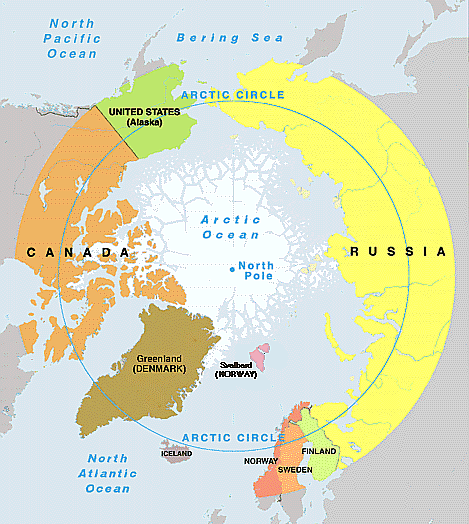 Establishing Maritime Boundaries in Arctic Waters. Establishing Maritime Boundaries in Arctic Waters. Arctic states are increasingly engaging in boundary-making at sea: the process of delineating areas of rights and responsibilities in the north. This entails drawing lines on a map to decide "who is allowed to do what in which area", but also establishing rules and regulations to prevent harmful effects on the environment and people as human activity grows. These efforts are in turn crucial for the trajectory of economic development in the north. The Arctic Institute Polar Night Shifts: How to Compensate the Arctic's Tough Work Conditions. The Extreme North's conditions - the polar night and severe climate - make it absolutely necessary in attracting human resources to the Arctic regions to consider the candidates' not only professional skills, but also psychological stability, experts told TASS. The companies, working in the north, equip premises with special lamps and grow plants in every room, thus keeping the personnel and caring for its working abilities. Those, working in the north, equip for themselves fitness and sports recreations. TASS 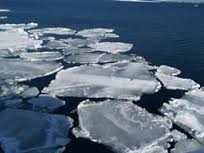 Disappearing Sea Ice Could Lead to Collapse of Vital Polar Food Chain. Disappearing Sea Ice Could Lead to Collapse of Vital Polar Food Chain. New research has shown algae that grow on the underside of the ice are the ultimate food source and can be traced through animals all the way up to the polar bear. Sky News filmed researchers working on Mijenfjorden in Svalbard for the Arctic Peril documentary. Research is showing algae produce a unique chemical called Ice Proxy 25 (IP25), which can be traced through the food chain. Sky News At Science Conference, University of Alaska Fairbanks Researchers Talk Arctic Changes. University of Alaska Fairbanks researcher Uma Bhatt said the process of global warming is simple. "More greenhouse gases in the atmosphere means the temperatures go up," the atmospheric scientist said. "What's complex is how the environment responds to it." The Arctic is rapidly warming - much faster than the global average. Alaska ecosystems are responding and changing in predictable and unforeseen ways. Fairbanks Daily News-Miner
|
|
Future Events
ISAR-5 Fifth International Symposium on Arctic Research, January 15-18, 2018 (Tokyo, Japan). The fifth ISAR has been planned at the recommendation of the science steering committee of ISAR-4, which was held in Toyama, Japan in April 2015. The fifth ISAR will be devoted to discussions on environmental changes in the Arctic and their regional and global implications, to seek additional international scientific collaboration in this area by gathering, synthesizing and sharing information related to these changes occurring in the Arctic. Special emphasis will be placed on the fields of the social sciences and humanities, which were not included in the previous ISARs. ISAR-5 will consist of general sessions and special sessions. The general sessions will address the following topics: atmosphere; ocean and sea ice; rivers, lakes, permafrost, and snow cover; ice sheets, glaciers, and ice cores; terrestrial ecosystems; marine ecosystems; geospace; policies and economy; and social and cultural dimensions. Special sessions will be solicited on cross-cutting themes.
NSF Principles for the Conduct of Research in the Arctic, Comments due January 16, 2018. The Interagency Arctic Research Policy Committee (IARPC), is seeking comments on how best to revise and strengthen the Principles for the Conduct of Research in the Arctic. A Federal Register Notice has been published to solicit community input. Since 1990, community engagement and Arctic research have advanced both in theory and in practice, necessitating a review and update of the current Principles. The Principles Revision Working Group of IARPC is seeking input from all stakeholders to revise and update the Principles. The update will focus on communicating clearly the Principles for community engagement by Arctic researchers and including language that describes partnerships and collaborations with Indigenous scholars, enhanced community-based observations, fostering community-based participatory research, and the integral contributions of Indigenous knowledge in the co-production and dissemination of knowledge. Input is also sought on enhancing the dissemination and implementation of the Principles. Comments can be emailed to iarpcprinciples@nsf.gov.
2018 Arctic Frontiers: Connecting the Arctic, January 21-26, 2018 (Tromso, Norway). Arctic Frontiers is an international arena on sustainable development in the Arctic. The conference addresses the management of opportunities and challenges to achieve viable economic growth with societal and environmental sustainability. Arctic Frontiers brings academia, government and business together to create a firmer foundation for decision-making and sustainable economic development in the Arctic. Join the Arctic Frontiers conference preparing the new Arctic future. The conference takes place the fourth week of January in the Norwegian city of Tromsø, known as the Gateway to the Arctic.
Alaska Marine Science Symposium, January 22-26, 2018 (Anchorage, Alaska.) The Alaska Marine Science Symposium (AMSS) is Alaska's premier marine research conference. For over 20 years, it has brought together scientists, educators, resource managers, students, and the public to discuss marine research conducted in Alaskan waters. Over 700 people attend this 4-day long conference held annually in January. Each day of the conference highlights Alaskan marine ecosystems: Arctic (Tuesday), Bering Sea & Aleutian Islands (Wednesday), and the Gulf of Alaska (Thursday). Research topics discussed range from ocean physics, fishes and invertebrates, seabirds, marine mammals, to local traditional knowledge. Website for 2018 meeting is here.
Alaska Forum on the Environment, February 12-16, 2018 (Anchorage, Alaska)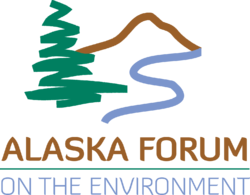 . AFE is a statewide gathering of environmental professionals from government agencies, non-profit and for-profit businesses, community leaders, Alaskan youth, conservationists, biologists and community elders. The diversity of attendees sets this conference apart from any other. The 2018 event will be our 20th year providing a strong educational foundation for all Alaskans and a unique opportunity to interact with others on environmental issues and challenges. . AFE is a statewide gathering of environmental professionals from government agencies, non-profit and for-profit businesses, community leaders, Alaskan youth, conservationists, biologists and community elders. The diversity of attendees sets this conference apart from any other. The 2018 event will be our 20th year providing a strong educational foundation for all Alaskans and a unique opportunity to interact with others on environmental issues and challenges.
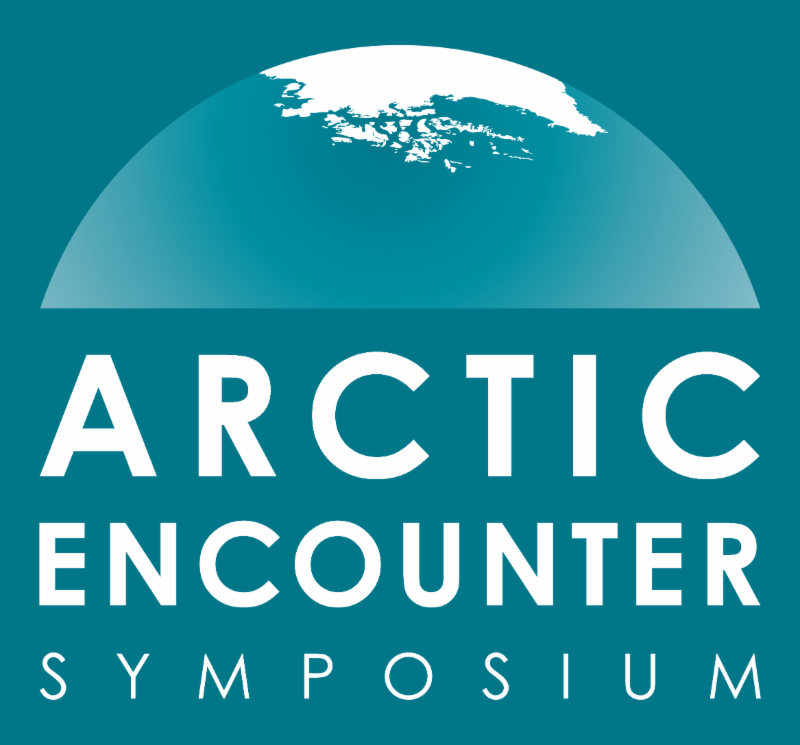 5th Annual Arctic Encounter Symposium (AES), April 19-20, 2018 (Seattle, WA, USA) 5th Annual Arctic Encounter Symposium (AES), April 19-20, 2018 (Seattle, WA, USA) - The Arctic Encounter, the largest annual Arctic policy conference in the U.S., will convene policymakers, industry leaders, scientists, Arctic artists and musical performers, and other stakeholders to debate and discuss emerging Arctic challenges and opportunities including policy, innovation, security, and development. The mission of AES is to raise awareness, engage challenges, and develop solutions for the future of the Arctic region and the people who live there. The 5th annual AES will take place in downtown Seattle at the Bell Harbor International Conference Center on Pier 66.
2018 North by North Festival, April 23-29, 2018 (Anchorage, Alaska USA). The North by North Festival captures the spirit of Alaska and the Arctic - to address our challenges and opportunities with Northern innovation and resilience, to build on a rich history and to ensure a future full of promise. The Festival is for the North, and organized by Northerners, with goals of sustainability, livability and growth. The Festival brings innovators from across Alaska, the nation and other Arctic regions to collaborate and address local and circumpolar challenges. Through knowledge, governance, business, design, film, music, food, literature and art, we celebrate the North.
The Effects of Climate Change on the World's Oceans, June 4-8, 2018 (Washington, DC USA). The 4th International Symposium will bring together experts from around the world to better understand climate impacts on ocean ecosystems - and how to respond. The event is hosted by a variety of groups including International Council for the Exploration of the Sea (ICES), N. Pacific Marine Science Organization (PICES), Intergovernmental Oceanographic Commission of UNESCO (IOC), and Food and Agriculture Organization of the United Nations (FAO).
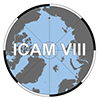
International Conference on Arctic Margins (ICAM) VIII, June 11-14, 2
The international Conference on Arctic Margins (ICAM) is a forum for earth scientists who study the Arctic. It was founded to help understand the little known Arctic geology and to foster cooperation and collaboration among Arctic researchers. There have been 7 meetings since its inception in 1991. See here for more information.
 POLAR 2018, June 15-27, 2018 (Davos, Switzerland). POLAR2018 is a joint event from the Scientific Committee on Antarctic Research (SCAR) and the International Arctic Science Committee (IASC). The SCAR meetings, the ASSW and the Open Science Conference will be hosted by the Swiss Federal Institute for Forest, Snow and Landscape Research WSL under the patronage of the Swiss Committee on Polar and High Altitude Research. The WSL Institute for Snow and Avalanche Research SLF is organizing POLAR2018. POLAR 2018, June 15-27, 2018 (Davos, Switzerland). POLAR2018 is a joint event from the Scientific Committee on Antarctic Research (SCAR) and the International Arctic Science Committee (IASC). The SCAR meetings, the ASSW and the Open Science Conference will be hosted by the Swiss Federal Institute for Forest, Snow and Landscape Research WSL under the patronage of the Swiss Committee on Polar and High Altitude Research. The WSL Institute for Snow and Avalanche Research SLF is organizing POLAR2018.
Arctic Observing Summit 2018, June 24-26, 2018 (Davos, Switzerland). The Arctic Observing Summit (AOS) is a high-level biennial summit that provides a platform to address urgent and broadly recognized needs of Arctic observing across all components of the Arctic system. AOS 2018 will be held in Davos, Switzerland ( June 24-26) and will focus on pressing issues in the implementation and support of sustained observations that can be addressed through a business-case lens. To that end, short submissions are requested that address any and all aspects of the overarching theme and sub-themes. Additional information can be found here.
17th International Congress of Circumpolar Health (ICCH17), August 12-15, 2018 (Copenhagen, Denmark). The ICCH congresses are held every third year in different locations in the circumpolar area and represent the largest scientific meetings worldwide on circumpolar health. The ICCH congresses serve as the primary source of information exchange and scholarly communication in issues relating to circumpolar health. More than 750 participants generally register and participate in each Congress, and more than 400 scientific papers or posters are usually presented.
The second Arctic Biodiversity Congress is hosted by the Conservation of Arctic Flora and Fauna (CAFF), the biodiversity working group of the Arctic Council, and the Ministry of the Environment, Finland. The second Arctic Biodiversity Congress will build on the success of the first Congress, held in 2014 in Trondheim, Norway, and will bring together scientists, policymakers government officials, Indigenous representatives, Traditional Knowledge holders, industry, non-governmental organizations, and others to promote the conservation and sustainable use of Arctic biodiversity.
|
|

  
4350 N. Fairfax Drive, Suite 510
Arlington, VA 22203, USA
External links in this publication, and on the USARC's World Wide Web site ( www.arctic.gov) do not constitute endorsement by the US Arctic Research Commission of external Web sites or the information, products or services contained therein. For other than authorized activities, the USARC does not exercise any editorial control over the information you may find at these locations. These links are provided consistent with the stated purpose of this newsletter and the USARC Web site.
|
|
|
|
|
|
|
|
|
 Researchers Seek Inuit Knowledge to Understand Kivalliq Snow Goose Boom. A new study plans to tap Inuit traditional knowledge to help understand why snow goose numbers have dramatically boomed near Coral Harbour and Arviat over the last 50 years. It's one of 41 studies funded by Polar Knowledge Canada, the federal agency that oversees Cambridge Bay's new Canadian High Arctic Research Station. The project aims to better understand the effects of these geese on the land, other wildlife and people, and to produce new management strategies and improve the way goose population issues are addressed. Nunatsiaq Online
Researchers Seek Inuit Knowledge to Understand Kivalliq Snow Goose Boom. A new study plans to tap Inuit traditional knowledge to help understand why snow goose numbers have dramatically boomed near Coral Harbour and Arviat over the last 50 years. It's one of 41 studies funded by Polar Knowledge Canada, the federal agency that oversees Cambridge Bay's new Canadian High Arctic Research Station. The project aims to better understand the effects of these geese on the land, other wildlife and people, and to produce new management strategies and improve the way goose population issues are addressed. Nunatsiaq Online Establishing Maritime Boundaries in Arctic Waters. Arctic states are increasingly engaging in boundary-making at sea: the process of delineating areas of rights and responsibilities in the north. This entails drawing lines on a map to decide "who is allowed to do what in which area", but also establishing rules and regulations to prevent harmful effects on the environment and people as human activity grows. These efforts are in turn crucial for the trajectory of economic development in the north. The Arctic Institute
Establishing Maritime Boundaries in Arctic Waters. Arctic states are increasingly engaging in boundary-making at sea: the process of delineating areas of rights and responsibilities in the north. This entails drawing lines on a map to decide "who is allowed to do what in which area", but also establishing rules and regulations to prevent harmful effects on the environment and people as human activity grows. These efforts are in turn crucial for the trajectory of economic development in the north. The Arctic Institute Disappearing Sea Ice Could Lead to Collapse of Vital Polar Food Chain. New research has shown algae that grow on the underside of the ice are the ultimate food source and can be traced through animals all the way up to the polar bear. Sky News filmed researchers working on Mijenfjorden in Svalbard for the Arctic Peril documentary. Research is showing algae produce a unique chemical called Ice Proxy 25 (IP25), which can be traced through the food chain. Sky News
Disappearing Sea Ice Could Lead to Collapse of Vital Polar Food Chain. New research has shown algae that grow on the underside of the ice are the ultimate food source and can be traced through animals all the way up to the polar bear. Sky News filmed researchers working on Mijenfjorden in Svalbard for the Arctic Peril documentary. Research is showing algae produce a unique chemical called Ice Proxy 25 (IP25), which can be traced through the food chain. Sky News






